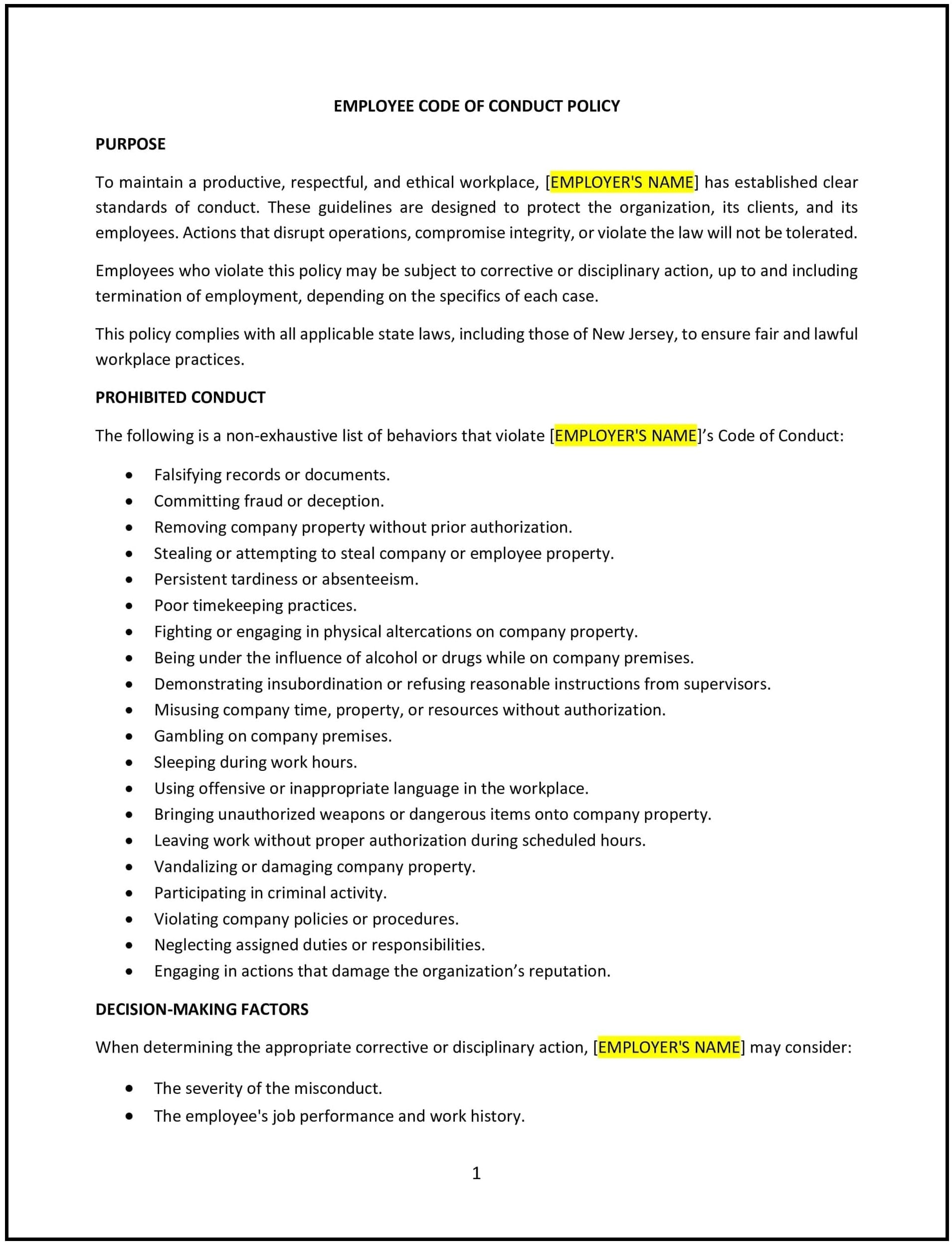Standards of conduct policy (New Jersey): Free template
Got contracts to review? While you're here for policies, let Cobrief make contract review effortless—start your free review now.

Customize this template for free
Standards of conduct policy (New Jersey)
A standards of conduct policy helps New Jersey businesses set clear expectations for employee behavior in the workplace. This policy outlines the company's values, the behaviors that are acceptable, and those that are not. It also addresses how employees should interact with colleagues, customers, and others, as well as the consequences of violating company policies.
By adopting this policy, businesses in New Jersey can promote a respectful, productive, and ethical workplace, ensuring that employees understand what is expected of them and how their behavior impacts the company.
How to use this standards of conduct policy (New Jersey)
- Define acceptable behavior: Specify the behaviors that are expected from employees, such as professionalism, respect, teamwork, and adherence to company values.
- Outline unacceptable behavior: Clearly state what constitutes inappropriate behavior, including harassment, discrimination, dishonesty, and misconduct.
- Address attendance and punctuality: Set expectations for employees’ attendance, punctuality, and adherence to work schedules.
- Define the use of company resources: Provide guidelines for using company property, including computers, phones, and other resources, and prohibit misuse or theft.
- Set the tone for workplace conduct: Establish how employees should conduct themselves during interactions with colleagues, supervisors, and clients, emphasizing respect and professionalism.
- Address conflicts of interest: Clarify any behaviors that may create conflicts of interest, such as accepting gifts or using company information for personal gain.
- Specify disciplinary action: Outline the potential consequences for violating company policies, from verbal warnings to termination, based on the severity of the violation.
- Review and update: Regularly assess the policy to reflect changes in New Jersey state laws, company practices, and the evolving workplace culture.
Benefits of using this standards of conduct policy (New Jersey)
This policy provides several benefits for New Jersey businesses:
- Promotes a respectful and ethical work environment: Sets clear expectations for behavior, creating a positive, respectful, and ethical workplace culture.
- Reduces workplace conflicts: Establishes guidelines for managing behavior, preventing misunderstandings and conflicts among employees.
- Enhances business reputation: Demonstrates the company’s commitment to professionalism, ethics, and employee respect, which strengthens the company’s reputation.
- Improves employee performance: Provides employees with clear standards for success, improving accountability and job satisfaction.
- Protects the business: Reduces the risk of legal issues related to employee conduct by establishing clear rules and consequences.
Tips for using this standards of conduct policy (New Jersey)
- Communicate the policy clearly: Ensure all employees understand the behavioral expectations and the consequences of not following them.
- Provide training: Train employees and managers on the standards of conduct, how to handle violations, and the importance of maintaining a positive work environment.
- Monitor behavior: Regularly assess employee behavior to ensure that company standards are being followed and that issues are addressed promptly.
- Be consistent: Enforce the standards of conduct consistently across all employees to avoid any perception of favoritism or unfair treatment.
- Review the policy regularly: Update the policy as needed to reflect changes in New Jersey laws, business practices, or organizational needs.